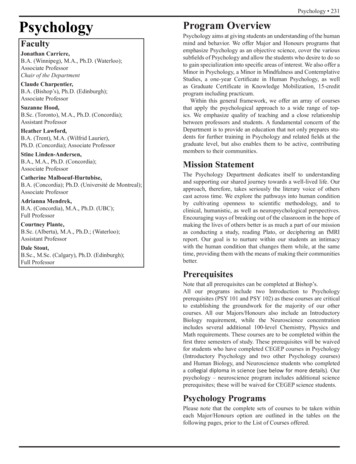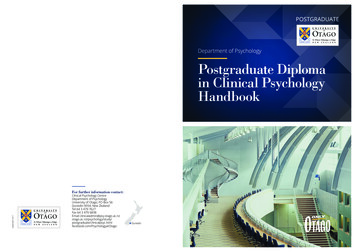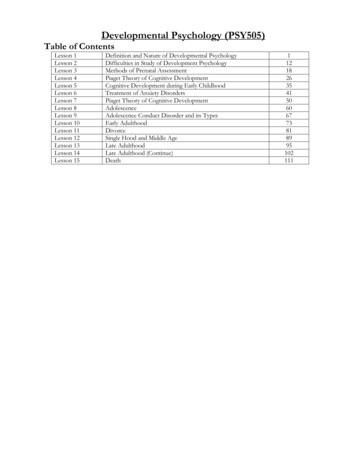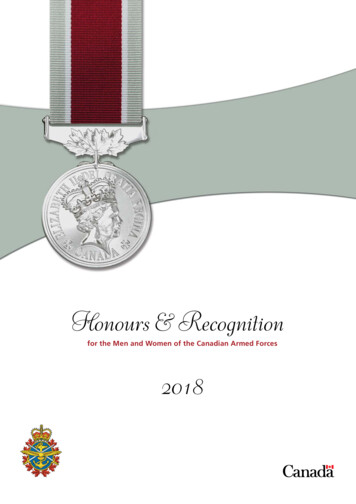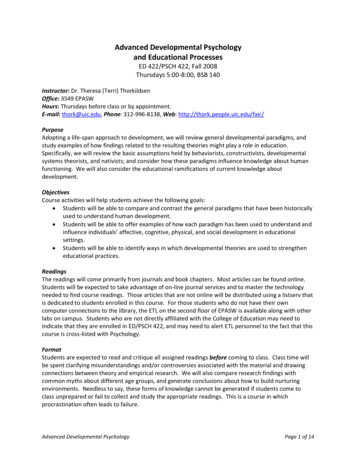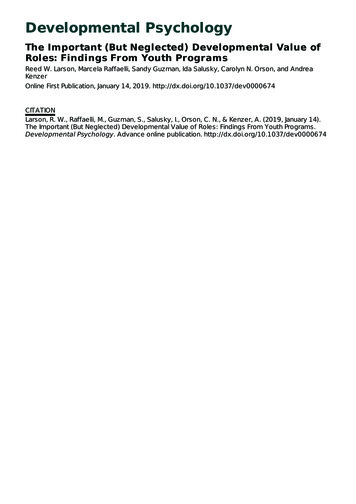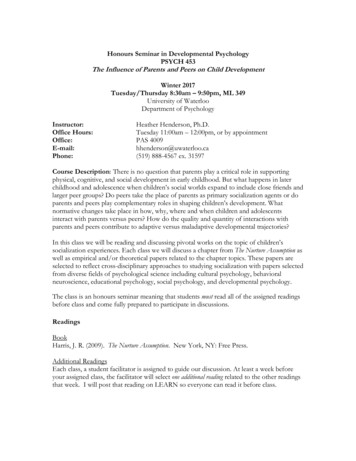
Transcription
Honours Seminar in Developmental PsychologyPSYCH 453The Influence of Parents and Peers on Child DevelopmentWinter 2017Tuesday/Thursday 8:30am – 9:50pm, ML 349University of WaterlooDepartment of PsychologyInstructor:Office Hours:Office:E-mail:Phone:Heather Henderson, Ph.D.Tuesday 11:00am – 12:00pm, or by appointmentPAS 4009hhenderson@uwaterloo.ca(519) 888-4567 ex. 31597Course Description: There is no question that parents play a critical role in supportingphysical, cognitive, and social development in early childhood. But what happens in laterchildhood and adolescence when children’s social worlds expand to include close friends andlarger peer groups? Do peers take the place of parents as primary socialization agents or doparents and peers play complementary roles in shaping children’s development. Whatnormative changes take place in how, why, where and when children and adolescentsinteract with parents versus peers? How do the quality and quantity of interactions withparents and peers contribute to adaptive versus maladaptive developmental trajectories?In this class we will be reading and discussing pivotal works on the topic of children’ssocialization experiences. Each class we will discuss a chapter from The Nurture Assumption aswell as empirical and/or theoretical papers related to the chapter topics. These papers areselected to reflect cross-disciplinary approaches to studying socialization with papers selectedfrom diverse fields of psychological science including cultural psychology, behavioralneuroscience, educational psychology, social psychology, and developmental psychology.The class is an honours seminar meaning that students must read all of the assigned readingsbefore class and come fully prepared to participate in discussions.ReadingsBookHarris, J. R. (2009). The Nurture Assumption. New York, NY: Free Press.Additional ReadingsEach class, a student facilitator is assigned to guide our discussion. At least a week beforeyour assigned class, the facilitator will select one additional reading related to the other readingsthat week. I will post that reading on LEARN so everyone can read it before class.
Evaluation:Discussion Facilitation (20% final grade): Students will be assigned to be the discussionfacilitator for one class over the course of the semester. Students are responsible for selectingan additional reading and for directing/facilitating the discussion during those classes.Students who are completing thought papers for that week (see below) will send their papersto the facilitator and instructor by noon the day before class so that the comments/questionsfrom the thought papers can be incorporated into the discussion. With our focus being ondiscussion and casual conversation, PowerPoint slides should be used judiciously.Thought Papers (40% final grade): Over the course of the semester, students will berequired to submit 8 short thought papers that summarize their opinions and ideas regardingthe chapter and supplemental readings for a given class. Good thought papers pull outintegrative themes from the readings, relate the material to prior class discussions, and posewonderment questions for the class to consider. Thought papers should (a) be a maximumof 2 double-spaced pages and (b) be sent to the instructor and that week’s facilitator no laterthan noon on the day before class (i.e., by 12pm on Monday or Wednesday).Final Opinion Paper (35% grade): At the end of the semester, students will submit a finalopinion paper that should be approximately 10 double-spaced pages in length. The paperwill reflect the student’s opinion regarding the provocative question of whether parentsmatter. Assuming we will all conclude that yes indeed parents matter, the focus of the paperwill be on how and why different socializing agents (parents vs. peers) have their impact ondevelopment. Details of the assignment will be discussed in class.Attendance and Participation (5% grade): This portion of your grade is based on yourattendance and the quality of your contributions to class discussions. This grade also reflectsyour timely submission of (a) a supplemental reading one week prior to your facilitator classand (b) your thought papers by noon the day prior to class.Schedule of ClassesWeek 1Jan 3rdIntroduction to Class; Organizational MeetingJan 5thReadings:Chapter: The Nurture Assumption Chapter 1Papers:1. Harris, J. R. (1995). Where is the child’s environment? A groupsocialization theory of development. Psychological Review, 102, 458-489.Week 2Jan 10thFacilitator: MikylaReadings:Chapter: The Nurture Assumption Chapter 2Papers:
1. Belsky, J. & Pluess, M. (2009). Beyond diathesis stress: Differentialsusceptibility to environmental influences. Psychological Bulletin, 135, 885908.2. TBAJan 12thFacilitator: KalynaReadings:Chapter: The Nurture Assumption Chapter 3Papers:1. Plomin, R. (2011). Commentary: Why are children in the same family sodifferent? Non-shared environment three decades later. InternationalJournal of Epidemiology, 40, 582-592.2. Burt, S. A. (2009). Rethinking environmental contributions to child andadolescent psychopathology: A meta-analysis of shared environmentalinfluences. Psychological Bulletin, 135, 608-637.Week 3Jan 17thFacilitator: JillReadings:Chapter: The Nurture Assumption Chapter 3 (cont)Papers:1. Roisman, G. I., & Fraley, R. C. (2012). A behavior-genetic study of thelegacy of early caregiving experiences: Academic skills, socialcompetence, and externalizing behavior in kindergarten. ChildDevelopment, 83, 728-742.2. Daw, J., Guo, G., & Harris, K. M. (2015). Nurture net of nature: Reevaluating the role of shared environments in academic achievement andverbal intelligence. Social Science Research, 52, 422-439.Jan 19thFacilitator: Michelle (Yoonjee) H.Readings:Chapter: The Nurture Assumption Chapter 4Papers:1. Backer-Grondahl, A., & Naerde, A. (in press). Self-regulation in earlychildhood: The role of siblings, center care and socioeconomic status.Social Development.2. TBAWeek 4Jan 24thFacilitator: MeryemReadings:Chapter: The Nurture Assumption Chapter 5Papers:1. Bates, T. C., Lewis, G. J., & Weiss, A. (2013). Childhood socioeconomicstatus amplifies genetic effects on adult intelligence. Psychological Science,24, 2111-2116.
2. TBAJan 26thFacilitator: JamesReadings:Chapter: The Nurture Assumption Chapter 6Papers:1. Sturge-Apple, M. L., Suor, J. H., Davies, P. T., Cicchetti, D., Skibo, M. A.,& Rogosch, F. A. (in press). Vagal tone and children’s delay ofgratification: Differential sensitivity in resource-poor and resource-richenvironments. Psychological Science.2. TBAWeek 5Jan 31stFacilitator: Meagan K.Readings:Chapter: The Nurture Assumption Chapter 6 (cont)Papers:1. Branchi, I., Curley, J. P., D’Andrea, I., Cirulli, F., Champagne, F. A., &Alleva, E. (2013). Early interactions with mother and peers independentlybuild adult social skills and shape BDNF and oxytocin receptor brainlevels. Psychoneuroendocrinology, 38, 522-532.2. TBAFeb 2ndFacilitator: KatherineReadings:Chapter: The Nurture Assumption Chapter 7Papers:1. Degner, J. & Dalege, J. (2013). The apple does not fall far from the tree,or does it? A meta-analysis of parent-child similarity in intergroupattitudes. Psychological Bulletin, 139, 1270-1304.2. TBAWeek 6Feb 7thFacilitators: Laiba & BeautyReadings:Chapter: The Nurture Assumption Chapter 8Papers:1. Waldrip, A. M., Malcolm, K. T., & Jensen-Campbell, L. A. (2008). Witha little help from your friends: The importance of high-quality friendshipson early adolescent adjustment. Social Development, 17, 832-852.2. TBAFeb 9thFacilitator: AjmeetReadings:Chapter: The Nurture Assumption Chapter 8 (cont)Papers:
1. Waldinger, R. J. & Schulz, M. S. (in press). The long reach of nurturingfamily environments: Links with midlife emotion-regulatory styles andlate-life security in intimate relationships. Psychological Science.2. TBAWeek 7Feb 14thFacilitator: Emily L.Readings:Chapter: The Nurture Assumption Chapter 9Papers:1. Hewlett, B. S., Fouts, H. N., Boyette, A. H., & Hewlett, B. L. (2011).Social learning among Congo Basin hunter-gatherers. PhilosophicalTransactions of the Royal Society B, 366, 1168-1178.2. TBAFeb 16thFacilitator: TylerReadings:Chapter: The Nurture Assumption Chapter 9 (cont)Papers:1. Murray, C. M., Lonsdorf, E. V., Stanton, M. A., Wellens, K. R., Miller, J.A., Goodall, J., & Pusey, A. E. (2014). Early social exposure in wildchimpanzees: Mothers with sons are more gregarious than mothers withdaughters. PNAS, 111, 18189-18194.2. TBAWeek 8*** STUDY BREAK; NO CLASSES Feb 20th-24th ***Week 9Feb 28thFacilitators: Aabi & RishigaReadings:Chapter: The Nurture Assumption Chapter 10Papers:1. Kornienko, O., Santos, C. E., Martin, C. L., & Granger, K. L. (2016).Peer influence on gender identity development in adolescence.Developmental Psychology, 52, 1578-1592.2. TBAMar 2ndFacilitator: AmandaReadings:Chapter: The Nurture Assumption Chapter 11Papers:1. Shin, H., & Ryan, A. M. (2014). Early adolescent friendships andacademic adjustment: Examining selection and influence processes with
longitudinal social network analysis. Developmental Psychology, 50, 24622472.2. TBAWeek 10Mar 7thFacilitator: YusraReadings:Chapter: The Nurture Assumption Chapter 11 (cont)Papers:1. Pfeiffer, J. P., Pinquart, M., & Krick, K. (2016). Social relationships,prosocial behaviour, and perceived social support in students fromboarding schools. Canadian Journal of School Psychology, 31, 279-289.2. TBAMar 9thFacilitators: Meghna & TingeeReadings:Chapter: The Nurture Assumption Chapter 12Papers:1. Hostinar, C. E., Johnson, A. E., & Gunnar, M. R. (2015). Parent supportis less effective in buffering cortisol stress reactivity for adolescentscompared to children. Developmental Science, 18, 281-297.2. TBAWeek 11Mar 14thFacilitator: DorothyReadings:Chapter: The Nurture Assumption Chapter 12 (cont)Papers:1. Doom, J. R., Doyle, C. M., & Gunnar, M. R. (2017). Social stressbuffering by friends in childhood and adolescence: Effects on HPA andoxytocin activity. Social Neuroscience, 8-21.2. TBAMar 16thFacilitators: AndrewReadings:Chapter: The Nurture Assumption Chapter 13Papers:1. Dishion, T. J., Veronneau, M-H., & Myers, M. W. (2010). Cascading peerdynamics underlying the progression from problem behavior to violencein early to late adolescence. Development and Psychopathology, 22, 603-619.2. TBAWeek 12Mar 21stFacilitator: KristenReadings:Chapter: The Nurture Assumption Chapter 13 (cont)Papers:
1. Beaver, K. M. (2008). Nonshared environmental influences on adolescentdelinquent involvement and adult criminal behavior. Criminology, 46, 341369.2. TBAMar 23rdFacilitator: MikeReadings:Chapter: The Nurture Assumption Chapter 14Papers:1. Moreira, J. F. G. & Telzer, E. H. (2016). Mother still knows best:Maternal influence uniquely modulates adolescent reward sensitivityduring risk taking. Developmental Science, 1-11.2. TBAWeek 13Mar 28thFacilitator: Megan S-EReadings:Chapter: The Nurture Assumption Chapter 15Papers:1. Belsky, J. & Pluess, M. (2013). Beyond risk, resilience, and dysregulation:Phenotypic plasticity and human development. Development andPsychopathology, 25, 1243-1261.2. TBAMar 30thConclusionsCourse Policies:Office Hours: If you would like additional assistance in order to achieve the goals of thiscourse, you can schedule a meeting with me or the course TA during our office hours (seetop of syllabus). Given the large number of students in this class, neither the TA nor I canaccept “drop in” appointments. If you need to meet with one of us outside of our scheduledoffice hours, please send an email to arrange an appointment. If you are struggling in this coursefor any reason, please meet with one of us as early in the semester as possible.Academic IntegrityIn order to maintain a culture of academic integrity, members of the University of Waterlooare expected to promote honesty, trust, fairness, respect and responsibility. See theUWaterloo Academic Integrity webpage and the Arts Academic Integrity webpage for moreinformation.Discipline: A student is expected to know what constitutes academic integrity, to avoidcommitting academic offences, and to take responsibility for his/her actions. A student whois unsure whether an action constitutes an offence, or who needs help in learning how toavoid offences (e.g., plagiarism, cheating) or about “rules” for group work/collaborationshould seek guidance from the course professor, academic advisor, or the UndergraduateAssociate Dean. When misconduct has been found to have occurred, disciplinary penalties
will be imposed under Policy 71 – Student Discipline. For information on categories ofoffenses and types of penalties, students should refer to Policy 71 - Student Discipline. Fortypical penalties check Guidelines for the Assessment of Penalties.Concerns About a Course Policy or DecisionInformal Stage. We in the Psychology Department take great pride in the high quality of ourprogram and our instructors. Though infrequent, we know that students occasionally findthemselves in situations of conflict with their instructors over course policies or gradeassessments. If such a conflict arises, the Associate Chair for Undergraduate Affairs (RichardEibach) is available for consultation and to mediate a resolution between the student andinstructor: Email: reibach@uwaterloo.ca; Ph 519-888-4567 ext. 38790A student who believes that a decision affecting some aspect of his/her university life hasbeen unfair or unreasonable may have grounds for initiating a grievance. See Policy 70 and72 below for further details.Grievance: A student who believes that a decision affecting some aspect of his/heruniversity life has been unfair or unreasonable may have grounds for initiating a grievance.Read Policy 70 - Student Petitions and Grievances, Section 4. When in doubt, please becertain to contact Richard Eibach, the Associate Chair for Undergraduate Affairs who willprovide further assistance; reibach@uwaterloo.ca.Appeals: A decision made or penalty imposed under Policy 70 - Student Petitions andGrievances (other than a petition) or Policy 71 - Student Discipline may be appealed if thereis a ground. A student who believes he/she has a ground for an appeal should refer to Policy72 - Student AppealsAccommodation for Students with DisabilitiesNote for students with disabilities: The AccessAbility Services office, located on the firstfloor of the Needles Hall extension (1401), collaborates with all academic departments toarrange appropriate accommodations for students with disabilities without compromisingthe academic integrity of the curriculum. If you require academic accommodations to lessenthe impact of your disability, please register with the AS office at the beginning of eachacademic term.Accommodation for Course Requirements Students requesting accommodation for course requirements (assignments, midtermtests, final exams, etc.) due to illness should do the following:o seek medical treatment as soon as possible and obtain a completed uWaterlooVerification of Illness Formo submit that form to the instructor within 48 hours.o (if possible) inform the instructor by the due date for the course requirementthat you will be unable to meet the deadline and that documentation will beforthcoming.
In the case of a missed final exam, the instructor and student will negotiate anextension for the final exam, which will typically be written as soon as possible, butno later than the next offering of the course. In the case of a missed assignment deadline, midterm test, or quiz, the instructor willeither:o waive the course component and re-weight remaining term work as he/shedeems fit according to circumstances and the goals of the course, oro provide an extension. In the case of bereavement, the instructor will provide similar accommodations tothose for illness. Appropriate documentation to support the request will be required. Students who are experiencing extenuating circumstances should also inform theiracademic advisors regarding their personal difficulties.Intellectual PropertyStudents should be aware that this course contains the intellectual property of their peers,instructor, and/or the University of Waterloo. Intellectual property includes items such as: Lecture content, spoken and written (and any audio/video recording thereof); Lecture handouts, presentations, and other materials prepared for the course (e.g.,PowerPoint slides); Work protected by copyright (e.g., any work authored by peers or the instructor usedby peers or the instructor with permission of the copyright owner).Course materials and the intellectual property contained therein, are used to enhance astudent’s educational experience. However, sharing this intellectual property without theintellectual property owner’s permission is a violation of intellectual property rights. For thisreason, it is necessary to ask peers and the instructor for permission before uploading andsharing the intellectual property of others online (e.g., to an online repository).Please alert the instructor if you become aware of intellectual property belonging to others(past or present) circulating, either through the student body or online. The intellectualproperty rights owner deserves to know (and may have already given their consent).Official Version of the Course OutlineIf there is a discrepancy between the hard copy outline (i.e., if students were provided with ahard copy at the first class) and the outline posted on LEARN, the outline on LEARN willbe deemed the official version. Outlines on LEARN may change as instructors develop acourse, but they become final as of the first class meeting for the term.
neuroscience, educational psychology, social psychology, and developmental psychology. The class is an honours seminar meaning that students must read all of the assigned readings before class and come fully prepared to participate in discussions. Readings Book Harris, J. R. (2009). The Nurture Assumption. New York, NY: Free Press.


